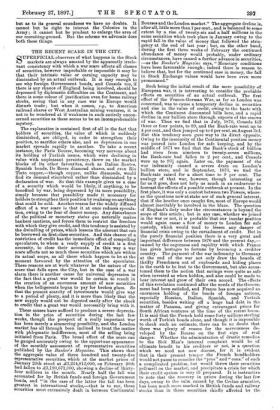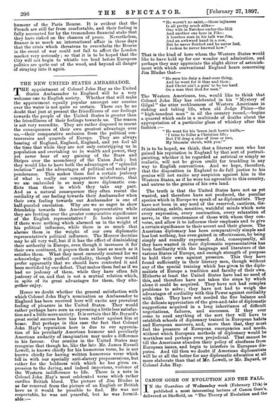THE RECENT SCARE IN THE CITY.
SUPERFICIAL observers of what happens in the Stock markets are always amazed by the apparently irrele- vant consistency with which a war scare affects all classes of securities, however improbable or impossible it may be that their intrinsic value or earning capacity may be diminished by an actual outbreak. It is easy enough to see why foreign Government bonds, and Consols too, if there is any chance of England being involved, should be depressed by diplomatic difficulties on the Continent, and there is some colour of justification even for home railway stocks, seeing that in any case war in Europe would disturb trade ; but when it comes, e.g., to American railroad shares or West Australian mining ventures, it is not to be wondered at if weakness in such entirely uncon- cerned securities as these seems to be an incomprehensible mystery.
The explanation is contained first of all in the fact that holders of securities, the value of which is suddenly diminished, are obliged, in order to strengthen their position, to sacrifice others also, and so depression in one market spreads rapidly to another. To take a recent instance, the Paris Bourse, becoming very nervous about its holding of Turkish issues, which were declining in value with unpleasant persistency, threw on the market blocks of its other favourites, such as Italian Rentes, Spanish bonds, De Beers diamond shares, and even Rio Tinto copper,—though copper, unlike diamonds, would find its demand stimulated rather than diminished by a declaration of war. So that this example gives us a case of a security which would be likely, if anything, to be benefited by war, being depressed by its mere possibility, simply because that possibility made it necessary for holders to strengthen their position by realising on anything that could be sold. Another reason for the widely diffused effect of a war scare is that it at once reduces specula- tion, owing to the fear of dearer money. Any disturbance of the political or monetary status quo naturally makes bankers cautious, and forces them to restrict the freedom with which they give credit, and this tendency is assisted by the dwindling of prices, which lessens the amount that can be borrowed on first-class securities. And this chance of a restriction of credit has the immediate effect of compelling speculators, to whom a ready supply of credit is a first necessity, to close their accounts. In this way a war scare affects not so much those securities which-are within its actual scope, as all those which happen to be at the moment favoured by the attention of the speculator. These reasons are at work whatever be the nature of the scare that falls upon the City, but in the case of a war alarm there is another cause for universal depression in the fact that a great war would be certain to result in the creation of an enormous amount of new securities when the belligerents began to pay for broken glass. So that the present scarcity of investments would give way to a period of plenty, and it is more than likely that the new supply would not be digested. easily after the shock to credit that a great war would necessarily bring with it.
These causes have sufficed to produce a severe deprecia- tion in the price of securities during the last few weeks, though the prospect of a really important war has been merely a simmering possibility, and the London market has all through been inclined to treat the matter with phlegmatic indifference, most of the selling being initiated from Paris. The broad effect of the scare can be gauged accurately owing to the opportune appearance of the monthly assessment of representative securities published by the Banker's Magazine. This shows that the aggregate value of three hundred and twenty-five representative securities, which at the market prices of January 20th stood at £3,224,812,000, on February 20th had fallen to £3,190,671,000, showing a decline of thirty- four millions in the month. Nearly half the fall was accounted for by British funds and foreign Government bonds, and "in the case of the latter the fall has been greatest in international stocks,—that is to say, those securities most extensively dealt in between Continental Bourses and the London market." The aggregate decline ie„ after all, little more than 1 per cent., and is balanced to some extent by a rise of twenty-six and a half millions in the- same securities which took place in January owing to the rapid fall in the value of money that followed the strin- gency at the end of last year ; but, on the other hand, during the first three weeks of February the continued. abundance of money would probably, under ordinary circumstances, have caused a further advance in securities, —as the Banker's Magazine says, " Monetary conditions have been favourable enough ; indeed there is reason to- believe that, but for the continued ease in money, the fall in Stock Exchange values would have been even more pronounced."
Such being the initial result of the mere possibility of. European war, it is interesting to consider the probable effects on securities of an actual outbreak. The first effect of the Franco-German War, as far as London was. concerned, was to cause a temporary decline in securities and rise in the value of credit, owing to the haste with which the Continent discounted bills here, and a rapid • decline in our bullion store through exports of the sinews of war. Thus we find that in July, 1870, Consols fell three or four points, to 89, and the Bank-rate went up to 4 per cent., and then jumped up to 6 per cent. on August 3rd. But this tendency soon gave way to its direct opposite. Owing to the insecurity of the Continental position money was poured into London for safe keeping, and by the middle of 1871 we find that the Bank's stock of bullion had risen from nineteen to twenty-seven millions, the Bank-rate had fallen to 2 per cent., and Consols- were up to 931 again. Later on, the payment of the war indemnity caused a severe drain on London's bullion store, and in September, 1873, we find the Bank-rate raised for a short time to 9 per cent. The analogy of that war, however, though interesting as far as it goes, does not help us much in an endeavour to forecast the effects of a possible outbreak at present. In the first place, it was only a contest between two Powers, where- as the questions now at stake are of such general interest, that if the heather once caught fire, most of Europe would almost inevitably be involved in the blaze. The question of England's duty under the circumstances is beyond the scope of this article ; but in any case, whether we joined in the war or not, it is probable that our insular position would again cause a flow of money to London for safe custody, which would tend to lessen any danger of financial crisis owing to the curtailment of credit. But in the purely financial position there is a very great and important difference between 1870 and the present day,— caused by the eagerness and rapidity with which France has given hostages to fortune by becoming a creditor country. The payment of the war indemnity to Germany at the end of the war not only drew the hoards of thrifty Frenchmen out of cupboards and hiding places in the earth to be lent to the Government, but also accus- tomed them to the notion that savings were quite as safe when invested as when hidden, and also could be made to bear interest and grow of their own accord. The effects of this revelation continued after the needs of the Govern- ment had been satisfied, and France has now acquired an enormous holding of the bonds of foreign nations, especially Russian, Italian, Spanish, and Turkish securities, besides writing off a huge bad debt in the matter of Panama, and giving extravagant prices for South African ventures at the time of the recent boom. It is said that the French hold some forty millions sterling worth of Turkish bonds alone, and though it is impossible to check such an estimate, there can be no doubt that there was plenty of reason for the nervousness de- veloped by the Bourse on the first sign of real danger. Whether the administration of drastic remedies to the Sick Man's internal complaint would be of ultimate benefit to his creditors or not, is a question i which we need not now discuss, for it is evident that in their present temper the French bondholders would not pause to consider the "pros" and " cons." of such a complicated problem, but would throw their securities pell-mell on the market, and precipitate a crisis for which their credit system is very ill prepared. It is instructive to note that the recovery in prices during the last few days, owing to the calm caused by the Cretan armistice, has been much more marked in British funds and railway stocks than in those securities chiefly affected by the humour of the Paris Bourse. It is evident that the French are still far from comfortable, and their feeling is fully accounted for by the tremendous financial stake that they have risked on the chances of peace. Nevertheless, finance is so much an international affair in these days that the crisis which threatens to overwhelm the Bourse in the event of war could not fail to affect the London market very seriously ; so that it is to be hoped that the City will not begin to whistle too loud before European politics are quite out of the wood, and beyond all danger of straying into it again.



































 Previous page
Previous page